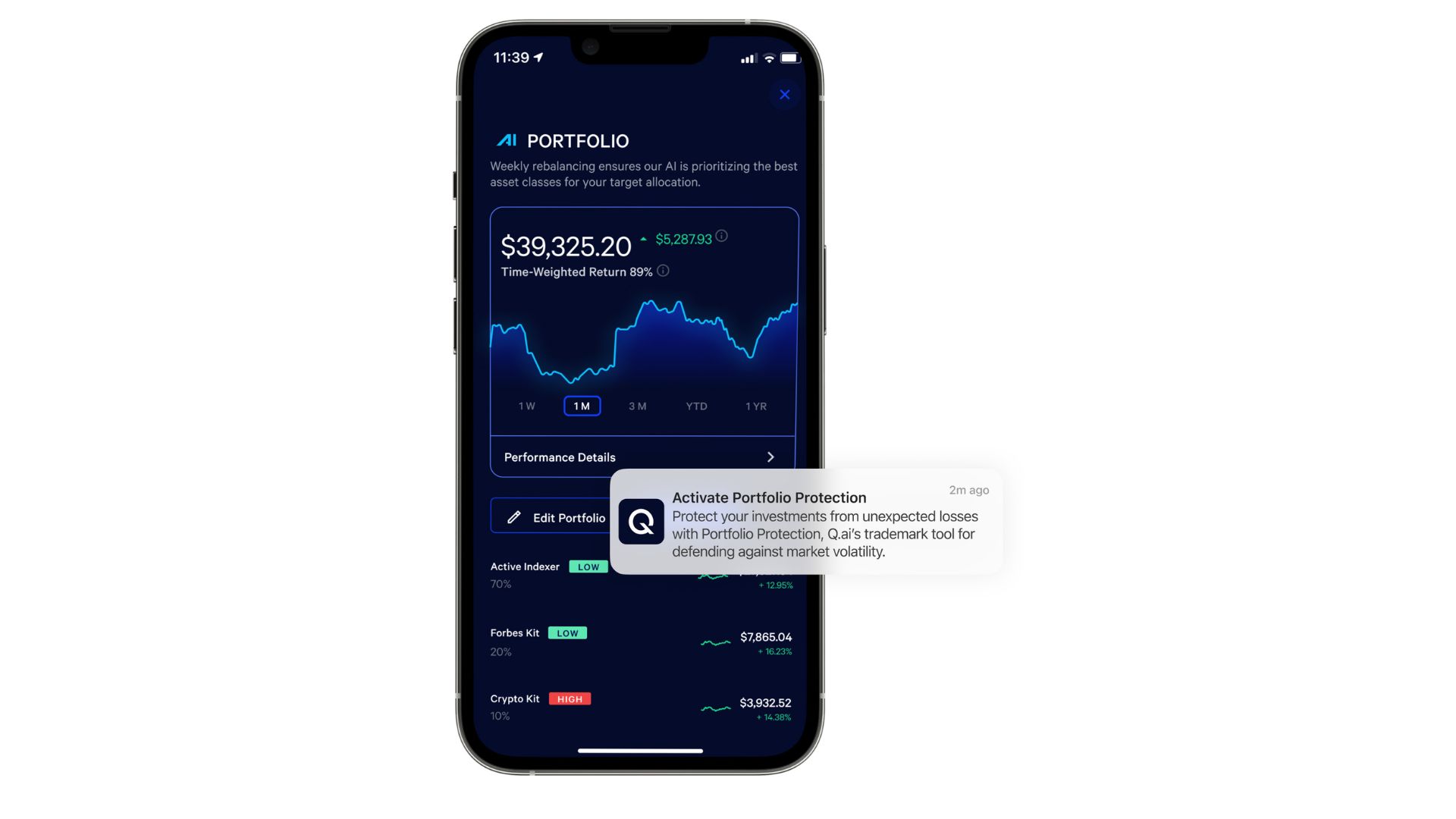| | | | | | | Presented By Q.ai | | | | Axios Markets | | By Matt Phillips and Emily Peck · Jul 26, 2022 | | ⚾️ Hello, marketeers. It's Matt. Another day of excitement is on tap as we head into the meat of the order for the second-quarter earnings season. ⚡️This morning, we'll get numbers from blue-chip aristocrats like McDonald's, Coca-Cola, General Motors and General Electric. - We'll see if their view of the future is as dour as Walmart's, which upended the applecart with a profit warning last night.
Today's newsletter, edited by Javier E. David, is 970 words, 4 minutes. | | | | | | 1 big thing: Inflation hits Walmart |  Data: FactSet; Chart: Axios Visuals Americans have shifted spending toward no-frills essentials like groceries and gas, a development that threatens to chip away at corporate profit margins, Matt writes. Driving the news: In a surprise after-the-bell announcement yesterday, Walmart cut its annual profit forecast. - America's largest retailer now says its earnings per share will be down between 10% and 12% this year compared to 2021.
Why it matters: Walmart is a bellwether of American consumption — a key driver of economic growth. What they're saying: Soaring food inflation "is affecting customers' ability to spend on general merchandise categories and requiring more markdowns to move through the inventory, particularly apparel," the company said in a statement. - The news sent Walmart shares down more than 9% in after-hours trading. Retailers fell in sympathy, with Target dropping more than 5%.
Flashback: Back in May, Walmart and Target suffered some of their steepest daily drops on record, after disclosing they would have to cut prices on piles of inventory that weren't selling because inflation shifted consumer behavior. - Yesterday's news shows how higher prices are still bedeviling efforts to sell more profitable goods.
- And retailers aren't alone. AT&T and Verizon have also recently told to investors they're seeing consumers change behavior as a result of surging inflation. (More below.)
The big picture: While this is painful for investors, it could be good for consumers. Walmart is essentially saying "we will be cutting a lot of prices on goods we're struggling to move." - With inflation running at 9.1%, that's exactly what the economy needs.
|     | | | | | | 2. ✂️ Profit forecasts were already getting cut |  Data: FactSet; Chart: Axios Visuals Even before Walmart's warning, Wall Street analysts were cutting forecasts for corporate profits over the next year, Matt writes. Why it matters: After a surge of pandemic-era profitability, corporate America's fat bottom lines are being pinched by a range of issues: inflation, energy price surges, and, of course, recession jitters. Driving the news: This week will be the busiest week of second-quarter earnings, with roughly 45% of S&P 500 companies reporting. By the numbers: At first glance, the start of the season hasn't been so bad. - About 75% of companies are reporting profits higher than the consensus expectation among analysts.
- Still, they're beating those numbers by a narrower gap than usual, according to data provider Refinitiv.
Yes, but: Since the Q2 earnings season began, analysts have been steadily trimming their profit forecasts, suggesting they don't like what they're hearing on the conference calls that typically follow the releases. - Cuts to expected profits are minor so far, or at least they were before Walmart made its announcement.
What they're saying: "It does seem universally agreed upon that estimates are too high and not reflecting the economic realities ahead," Piper Sandler analysts wrote in a note to clients yesterday. |     | | | | | | 3. Catch up quick | | ⚡️ EU agrees to sweeping curbs on energy use, as prices soar. (NYT) 🚘 GM misses expectations as supply chain issues bite. (CNBC) 🚨 Coinbase faces SEC inquiry over crypto listings. (Bloomberg) 📈 Alibaba to seek primary listing in Hong Kong. (WSJ) |     | | | | | | A message from Q.ai | | Stop aimlessly chasing hot stock tips | | |  | | | | Sure, you can hunt down hot stock tips from the depths of the internet, but when's the last time that worked out? Instead, get ahead of the crowd and let advanced AI from Q.ai make smart investment decisions for you. Open an account for free. Fund it with $100 or more and get a $100 bonus. | | | | | | 4. 💬 Quoted: "An increase in bad debt" | | "On the consumer side of our business, we're seeing an increase in bad debt to slightly higher than pre-pandemic levels, as well as extended cash collection cycles." John T. Stankey, CEO of AT&T, on the company's recent conference call with analysts. Translation: AT&T is seeing an uptick in late payments from consumers. Why it matters: The rise in delayed payments confirms that surging inflation is eating into the household spending power, Matt writes. - Since the U.S. economy is roughly two-thirds consumption, this could signal that economic headwinds are growing, and consumers are struggling to keep up.
FWIW: Verizon didn't see similar payment problems, but executives there did tell analysts last week that "the inflationary environment is clearly impacting consumer behavior," and that sales of wireless devices remain challenged. Yes, but: If you're looking for good news, there are some signs of inflation easing, which would ease some of that burden on consumers. - Gasoline prices, for instance, are down to roughly $4.35 a gallon, from $5 a gallon in June, according to AAA.
|     | | |  | | | | If you like this newsletter, your friends may, too! Refer your friends and get free Axios swag when they sign up. | | | | | | | | 5. Russia's got problems |  | | | Illustration: Shoshana Gordon/Axios | | | | Sanctions have been effective at crippling the Russian economy. That's the conclusion of a new 118-page paper from Yale's Jeffrey Sonnenfeld and 18 c0-authors, Axios' Felix Salmon writes. Why it matters: The big question about Russia sanctions is whether they have teeth if they exclude Russian oil and gas. - While official Russian statistics suggest the economy is using its oil and gas revenues to withstand the effects of sanctions, Sonnenfeld's paper says that the official Russian statistics are lies.
What they found: The paper's results include sobering facts about the Russian economy. - "Russian imports have largely collapsed," the paper says — creating massive supply shortages and denying the country crucial parts and technologies.
- "Russian domestic production has come to a complete standstill."
- Foreign companies that have left Russia account for 40% of Russian GDP, the author wrote, almost none of which is going to come back any time soon.
The conclusion: "Looking ahead, there is no path out of economic oblivion for Russia as long as the allied countries remain unified in maintaining and increasing sanctions pressure." Driving the news: Russia has announced further cuts in its supply of natural gas to Europe. But the paper makes the case that Russia needs Europe to buy its natural gas more than Europe needs Russian natural gas to buy. - Because natural gas is "a highly non-fungible commodity," delivered through pipes that take decades to build, Russia has very few alternative export markets for its gas, and 83% of its natural gas exports go to Europe.
- Europe, on the other hand, imports just 46% of its natural gas from Russia.
The bottom line: The economic repercussions of Russia's war of aggression in Ukraine are being felt in all countries. But they're particularly devastating in Russia — with little if any future upside so long as sanctions remain in place. |     | | | | | | A message from Q.ai | | Get a $100 bonus when you start investing like a pro | | |  | | | | Q.ai lets you invest like a pro — for free. Just open an account and pick an investing theme or themes. Leave the rest to the award-winning AI, which will continuously manage risk for you. Even better: Double your investment. Deposit $100 or more and get a $100 sign-up bonus. Get started today. | | | | 📧 1 thing we love: subscribers! Did someone email you this newsletter? You can sign up here to get Markets and our other great business updates in your inbox every day. |  | | Why stop here? Let's go Pro. | | | | | | Axios thanks our partners for supporting our newsletters. If you're interested in advertising, learn more here.
Sponsorship has no influence on editorial content. Axios, 3100 Clarendon Blvd, Arlington VA 22201 | | | You received this email because you signed up for newsletters from Axios.
Change your preferences or unsubscribe here. | | | Was this email forwarded to you?
Sign up now to get Axios in your inbox. | | | | Follow Axios on social media:    | | | | | |











No comments:
Post a Comment